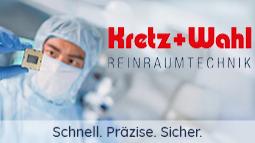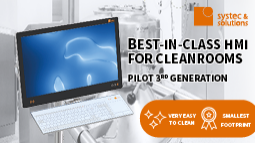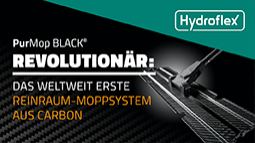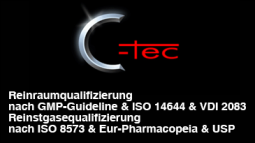Royal Society of Chemistry Unveils its Conference for Lab Innovations 2013
The Royal Society of Chemistry (RSC) is bringing together leading scientists, technical experts and two of science’s most famous names, in a special free-to-attend conference at easyFairs LAB INNOVATIONS on 6 &7 November 2013 at Birmingham’s NEC.
Details of the two-day conference, carefully devised by the RSC for laboratory managers, researchers and scientists, have just been released. The conference will feature three concurrent strands which explore the latest developments in equipment and best practice for the medicinal, pharmaceutical and chemical industries.
The centre-piece of each day will be a keynote address. These are being given by two of the biggest names in science – world-famous fertility expert, Lord Professor Robert Winston plus Professor Andrea Sella, whose chemistry demonstrations have filled theatres around the world.
On the first day of the conference Andrea Sella will explore the names behind well established lab apparatus such as the Büchner funnel or the Liebig condenser. Who were these people and how did they come to invent these pieces of glassware or apparatus? Sella will answer this and consider how apparatus designers in some cases have changed the world, by revealing hidden structures that were previously invisible. Appropriately, for the science-showman, his talk will be illustrated with demonstrations.
While Andrea Sella’s talk is showing how equipment advances can transform the way labs operate, Bob Keighley, Product Manager Spectroscopy at Shimadzu will then bring this right up to date by demonstrating how new technology has made advanced spectroscopy more accessible to everyone.
Day one will also feature Steve Wright, Principal Scientist at Microsaic Systems who’s talking about ‘a flexible and deployable miniature mass spectrometer for the pharmaceutical laboratory’.
Budgets are always under pressure; for lab professionals that means finding ways to minimise operating costs without compromising on safety. Keith Beattie, Head of Life Sciences at the Energy Efficiency Consultancy will outline some new thinking on a practical approach for lab managers to control costs whilst maintaining safety.
The individual presentations on the first day will be rounded off by a session by Anthony Lenk, Director of Romil on accreditation, traceability and the role of certified reference materials in the modern lab.
Lord Professor Robert Winston delivers the keynote address on day two of Lab Innovations. He will consider science’s response to ‘our uncertain future.’ In addition to hearing him speak, 10 show visitors will also win the opportunity to put their questions directly to Lord Winston as part of an intimate, private Q&A roundtable discussion he is hosting during Lab Innovations.
Scientists looking for insights into how to overcome the complexities of bioanalysis will find plenty of food for thought in a session delivered by Dr David Neville, Technical Expert at RSSL Pharma who will outline a multifaceted approach to biomolecule analysis.
Ben Crossley, Research Chemist at Yorkshire Process Technology will share its development of a reusable immobilized iridium catalyst. This has been done to obtain a catalyst with homogenous selectivity/activity and heterogeneous ease of separation. Crossley will outline how the new catalysts when characterized and evaluated against model transfer hydrogenations have shown minimal leaching of catalytic material into the reaction medium and a high precious metal recovery.
Medicinal chemists need to have access to analytical instrumentation, and for convenience and productivity those instruments need to be close to the chemists who use them. Yet high capital and maintenance costs make it unattractive to install and support analytical instruments in every medicinal chemistry lab. Chris Howson, Scientist at Novartis Pharma UK will explain how it combated this challenge through its LAB2LAB project. This connected remote labs on different floors within a building to instrumentation in a disparate analytical chemistry lab.
Pharmaceutical companies are confronted with challenging R&D timelines and resources. This makes the prediction of product shelf life of solid dosage forms during early formulation design activities increasingly important. Pioneering methods of using stability data generated under accelerated storage conditions to reach the shelf-life calculation will be discussed by Bernard Schneider, Managing Director of RPD Tool. He will outline how his company has built on original concepts to develop a new automated system. This will include an example of an accelerated stability study.
On both days the conference will close with a roundtable panel debate chaired by The Royal Society of Chemistry and giving industry experts and show attendees an opportunity to discuss the critical issues affecting the sector.
In addition to the conference programme, LAB INNOVATIONS will play host to a full exhibition, featuring the latest laboratory technology & consumables, analytical & biotech equipment from over 100 companies. There will be a UKAS Contract Lab Pavilion plus Campden BRI technical workshops.
Lab Innovations is the UK’s only event dedicated to laboratory equipment, technology and services. The show is already supported by the Royal Society of Chemistry, Campden BRI and Gambica and its attendees are lab managers and scientists working within the chemical, life sciences, food & beverage industries plus those in research institutions.
easyFairs UK Ltd
TW1 3QS Twickenham
United Kingdom








